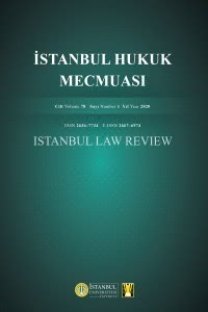Bosphorus Davası: Avrupa Adalet Divanı ve Avrupa İnsan Hakları Mahkemesi Kararlarlarının Değerlendirilmesi
Uluslararası hukukta yeknesaklaşmış bir kurallar bütünün bulunmayışı, buna ek olarak uluslararası divan ve mahkemeler arasında hiyerarşik bir ilişki bulunmaması ve bunların yargı yetkilerinin zaman zaman çakışması, uluslararası kurumların güvenilirliği ile temel hak ve özgürlüklerin korunması bakımından olumsuz sonuçlara yol açmaktadır. Avrupa Adalet Divanı ve Avrupa İnsan Hakları Mahkemesi'nin kamu yararı ile kişilerin temel hak ve özgürlükleri arasında denge kurmaya çalıştığı Bosphorus davası, Yugoslavya Federal Cumhuriyeti döneminde ortaya çıkmış ve döneme damgasını vurmuştur. Bu makale, her iki mahkeme kararının özet ve değerlendirmesini içermektedir. Bu değerlendirmede özellikle Avrupa İnsan Hakları Mahkemesi'nin, Avrupa Topluluğu bünyesindeki insan hakları koruması bakımından Avrupa Adalet Divanı'nın yaptığı değerlendirme ile çatışmaktan kaçınan bir yaklaşım sergilemiş olmasına dikkat çekilmektedir.
Anahtar Kelimeler:
Bosphorus Havayolları, Yugoslavya Federal Cumhuriyeti, Avrupa Adalet Divanı, Avrupa İnsan Hakları Mahkemesi, malvarlığının korunması, kamu yararı, eşdeğer koruma doktrini, aksi ispatlanabilir (adi) uygunluk karinesi, aşikar yetersizlik
-
The lack of a unified set of rules in international law, backed with the lack of hierarchy between the international courts and tribunals, as well as their overlapping jurisdictions create serious obstacles at the expense of the credibility of international institutions and the fundamental rights of private persons and entities. “Bosphorus” constitutes one of the landmark cases handled in the face of the war in the Federal Republic of Former Yugoslavia, where the ECJ and the ECtHR come to a position to choose between two crucial conflicting interests, namely the public interest pursued by the international rules, and the fundamental rights and freedoms of individuals suffering from the application of these rules. This essay initially articulates the facts of “Bosphorus” including the analysis of the ECJ’s preliminary ruling, and the elaboration of the ECtHR decision. Subsequently, a critical analysis of the ECHR judgment will be made. Here, the focus will be on the ECtHR’s assessment regarding the EC’s protection of fundamental rights, with a rather compromising approach avoiding to tamper with the ECJ’s analysis and evaluation. * LL.M., Koç University Law School.
Keywords:
Bosphorus Airlines, Former Federal Republic of Yugoslavia, European Court of Justice, European Court of Human Rights, protection of property, public interest, equivalent protection doctrine, rebuttable presumption of compliance, manifest deficiency test.,
- ISSN: 2636-7734
- Yayın Aralığı: 4
- Başlangıç: 1935
- Yayıncı: İstanbul Üniversitesi Yayınevi
Sayıdaki Diğer Makaleler
SAĞLIK MESLEĞİ MENSUPLARININ SUÇU BİLDİRMEMESİ SUÇU (TCK M.280)
30. YAŞINDA BM KADINLARA KARŞI AYRIMCILIĞIN ORTADAN KALDIRILMASI KOMİTESİ: (1982- 2012)
SEVGİLİ FÜSUN İÇİN BİR ANI VE İSKOÇ JÜRİSİNİN KARAR SEÇENEKLERİ
ÇALIŞMA HAYATINDA KADINA YÖNELİK ŞİDDET: SAĞLIK SEKTÖRÜNDE BİR UYGULAMA
